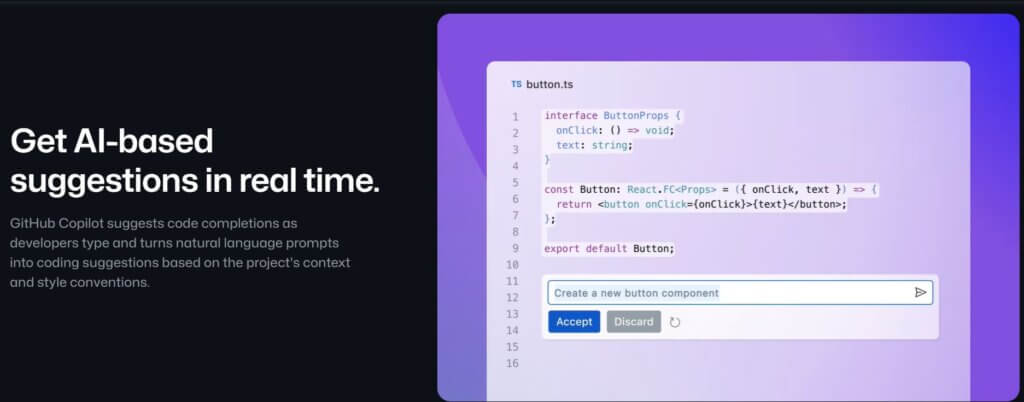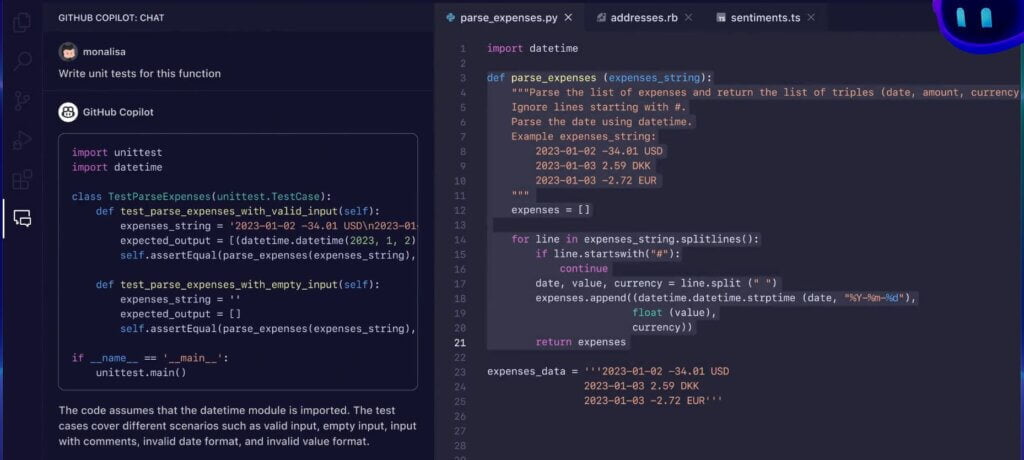Introduction:
Are you tired of the repetitive grind of coding, constantly battling bugs, and endlessly scouring for solutions? You’re not alone in this struggle. Fortunately, there’s a game-changer in town. Meet GitHub Copilot, the developer’s new best friend. This cutting-edge AI tool is here to revolutionize your coding experience.
GitHub Copilot utilizes machine learning to analyze your coding context and suggest optimized code snippets, saving you time and effort. Whether you’re a seasoned developer or just starting, Copilot AI adapts to your needs, offering tailored assistance across a spectrum of programming languages.
The beauty of Copilot lies in its versatility; it seamlessly integrates into your workflow, streamlining the coding process regardless of your project’s language or complexity.
But what’s all the buzz about? Let’s delve into why GitHub Copilot has garnered such acclaim and explore how it can transform your coding journey.
Ready to supercharge your productivity and elevate your coding prowess? Strap in as we unravel the wonders of GitHub Copilot and unveil the endless possibilities it brings to the table.
What is GitHub Copilot?
GitHub Copilot stands as an AI-driven coding helpmate, a brainchild of GitHub in tandem with OpenAI. This nifty tool harnesses the power of GPT (Generative Pre-trained Transformer) technology to lend a helping hand to developers in their coding endeavors.
With over 1 million users already on board, as per official statistics, GitHub Copilot’s popularity speaks volumes.
At its core, GitHub Copilot’s charm lies in its ability to streamline coding processes. By analyzing the context of your code, it deftly suggests potential completions and even entire lines of code, effectively slashing the time spent on manual typing. This proves to be a godsend, especially for those grappling with mammoth codebases or intricate projects.
GitHub Copilot plays well with a plethora of programming languages and integrated development environments (IDEs), ensuring accessibility for developers across the board. Whether you’re fluent in Python, proficient in Java, or a maestro in C++, GitHub Copilot has got your back.
In essence, GitHub Copilot emerges as a boon for developers, offering a seamless blend of efficiency and convenience in the coding journey.
Prerequisites to get access to GitHub Copilot
To get your hands on the coding help of GitHub Copilot, there are a few key requirements you’ll need to meet:
1. GitHub Account: Firstly, you’ll need to have a GitHub account. Not to worry if you don’t have one yet – signing up is a breeze and it’s completely free. Just head over to the GitHub website and follow the simple sign-up process.
2. Compatible Code Editor: Next up, you’ll need a code editor that supports the GitHub Copilot extension. Fortunately, GitHub Copilot plays nice with a variety of editors like Visual Studio Code, IntelliJ IDEA, and others that support the Language Server Protocol. So, if you’re already using one of these editors, you’re good to go!
3. Install the Extension: Lastly, you’ll need to install the GitHub Copilot extension for your chosen code editor. Depending on which editor you’re using, you can find the extension ready for download either in the Visual Studio Code Marketplace or the JetBrains Marketplace.
GitHub Copilot integrations
GitHub Copilot seamlessly integrates into code editors supporting the Language Server Protocol (LSP), amplifying its coding help across various platforms. This means that any editor with LSP support can tap into GitHub Copilot’s AI prowess, delivering intelligent code suggestions to developers.
Beyond the popular editors like Visual Studio Code, Atom, and Sublime Text, a slew of third-party tools are jumping on the GitHub Copilot bandwagon, enriching their functionalities. Take DeepCode, for instance, an AI-driven code review tool now synchronized with GitHub Copilot, offering automated suggestions to tackle potential glitches and vulnerabilities.
Further expanding its reach, tools like Sourcegraph and Kite join forces with GitHub Copilot, enhancing code navigation and autocompletion capabilities. Leveraging Copilot’s AI suggestions, these tools empower developers to traverse codebases with newfound speed and efficiency.
GitHub Copilot goes the extra mile with its REST API, granting third-party tools programmatic access to its AI suggestions. This opens up avenues for building bespoke integrations and workflows, tailored to harness the full potential of GitHub Copilot’s capabilities.
Features of GitHub Copilot AI

GitHub Copilot boasts an array of features geared towards providing top-notch coding help and streamlining the development process:
1. Code Suggestions: Using AI wizardry, GitHub Copilot suggests code snippets tailored to the context of your coding session. These suggestions accelerate your coding pace while minimizing errors along the way.
2. Natural Language Processing: With GitHub Copilot’s natural language prowess, you can describe code tasks in plain English, and it’ll whip up corresponding suggestions. For instance, typing “function to sort a list of numbers” prompts Copilot to generate just that—a function to sort your numerical lists.
3. Support for Multiple Programming Languages: GitHub Copilot isn’t picky—it plays nice with a plethora of programming languages, encompassing the likes of Python, JavaScript, TypeScript, Ruby, Go, and more.
4. Integration with Code Editors: Designed to mesh seamlessly with code editors supporting the Language Server Protocol (LSP), GitHub Copilot finds its home in popular editors like Visual Studio Code, Atom, and Sublime Text.
5. Personalization: GitHub Copilot is a quick learner. It takes cues from your coding style and preferences, adapting its suggestions over time to align more closely with your unique coding mojo.
6. Privacy and Security: Rest easy knowing that GitHub Copilot values your privacy and security. It keeps your code on lockdown, refraining from uploading it to the cloud or storing any of your personal data.
How GitHub Copilot helps improve your coding

Let’s delve into how GitHub Copilot can lend a hand through practical coding examples across different programming languages, enriching your software development journey:
1. Incorporating Hashtable in JavaScript:
Imagine you’re knee-deep in a Java project, tasked with integrating a Hashtable—a custom data structure. Your goal? Craft a class that effortlessly handles key-value pairs, ensuring lightning-fast lookup, insertion, and deletion operations. With GitHub Copilot in tow, you’ll find yourself effortlessly generating the necessary code snippets, streamlining the implementation process and leaving more room for creativity.
2. Making HTTP Requests in JavaScript:
You’re deep into building a JavaScript web app, itching to fetch data from an external API. Your mission? Whip up a function that orchestrates the HTTP request and elegantly parses the response for display. Thanks to GitHub Copilot’s intuitive suggestions, crafting this essential functionality becomes a breeze. Say goodbye to tedious manual coding and hello to streamlined, error-free HTTP requests.
3. Custom Data Structure in Python:
Now, let’s shift gears to Python territory. You’re immersed in a Python project, tasked with fashioning a custom data structure known as a trie. Your objective? Create a class that efficiently manages a collection of strings while seamlessly supporting prefix matching. With GitHub Copilot at your side, you’ll effortlessly generate code snippets that breathe life into your custom data structure, saving you time and effort along the way.
What is Copilot X?
Introducing Copilot X, the latest buzz in the developer community, bringing a fresh twist to the Copilot tool.
With Copilot X’s innovative chat mode, developers gain a powerful ally for real-time code debugging, writing, refactoring, testing, and debugging—all within a single interface. But that’s just the beginning! Copilot X goes the extra mile by providing AI-generated answers to documentation queries, elevating productivity to new heights.
What sets Copilot X apart is its utilization of OpenAI’s GPT-4 technology, based on GitHub’s Codex model derived from GPT-3. This robust foundation ensures unparalleled reliability and accuracy, making Copilot X an indispensable asset for developers.
In a recent demonstration, GitHub showcased Copilot X’s capabilities by effortlessly building the classic Snake game—a testament to its versatility and prowess.
But the innovation doesn’t stop there. GitHub offers a sneak peek into upcoming features, including auto-generated pull request descriptions and tags, streamlining manual processes. Additionally, the promise of Copilot for documents looms on the horizon, poised to revolutionize documentation retrieval across repositories and internal resources, all presented in a ChatGPT-like interface.
These advancements promise to enrich the developer experience, providing smarter, more efficient solutions to coding challenges. With Copilot X leading the charge, developers can expect to work smarter, not harder, as they navigate the intricate landscape of software development.
Conclusion: GitHub Copilot AI
In conclusion, GitHub Copilot and its innovative counterpart, Copilot X, stand as invaluable assets for developers seeking to streamline their coding processes and enhance productivity. GitHub Copilot’s AI-driven assistance, coupled with its seamless integration with various code editors, offers a powerful solution for coding challenges across multiple programming languages. With features like code suggestions, natural language processing, and personalized assistance, GitHub Copilot empowers developers to write better code faster and with greater accuracy.
Meanwhile, Copilot X introduces a new dimension to the coding experience, incorporating real-time chat mode functionality and AI-generated documentation assistance powered by OpenAI’s GPT-4 technology. These advancements promise to revolutionize coding workflows, providing developers with intelligent tools to tackle complex tasks with ease.
As the developer community continues to embrace these cutting-edge tools, the future of software development looks brighter than ever. With GitHub Copilot and Copilot X leading the way, developers can navigate the coding landscape with confidence, efficiency, and innovation, driving progress and success in their projects.

